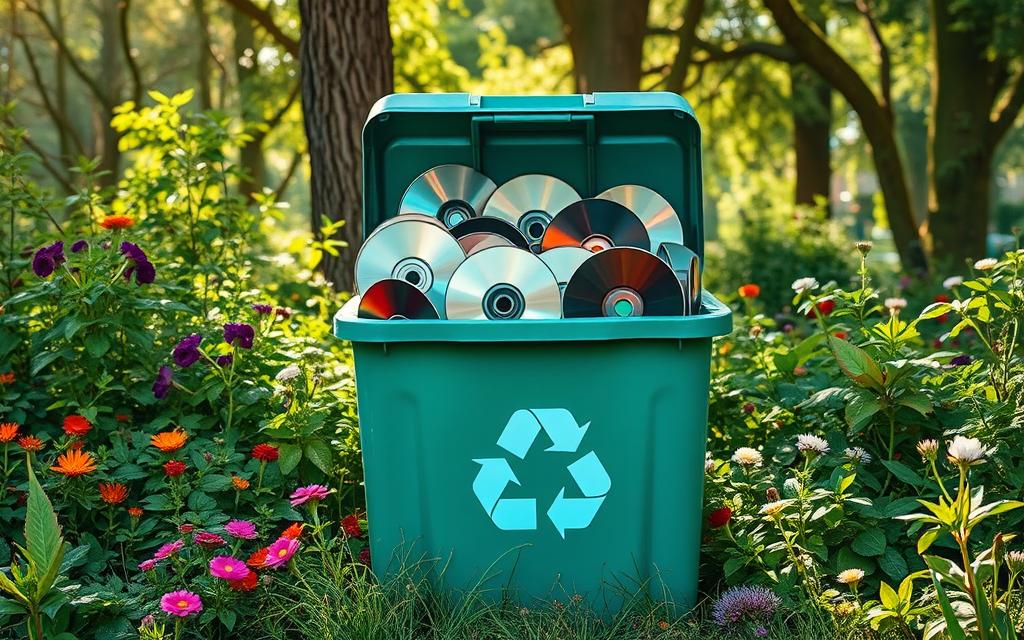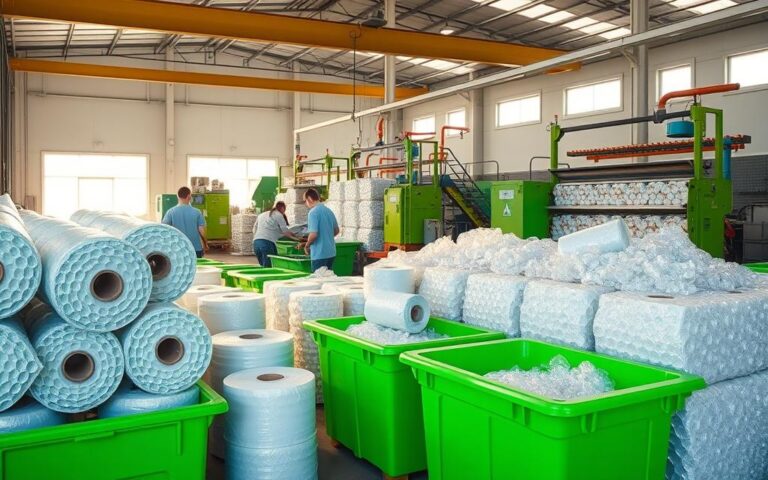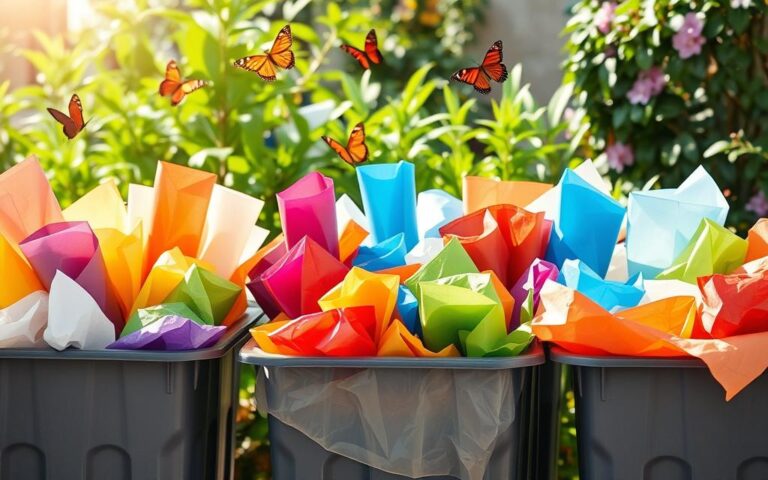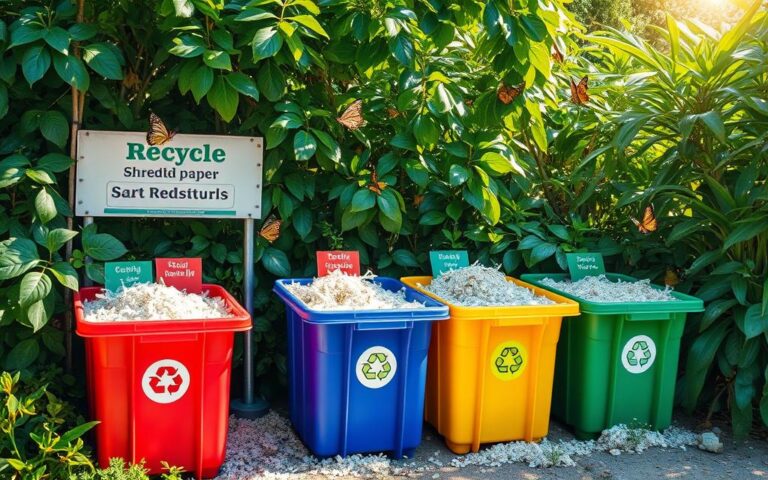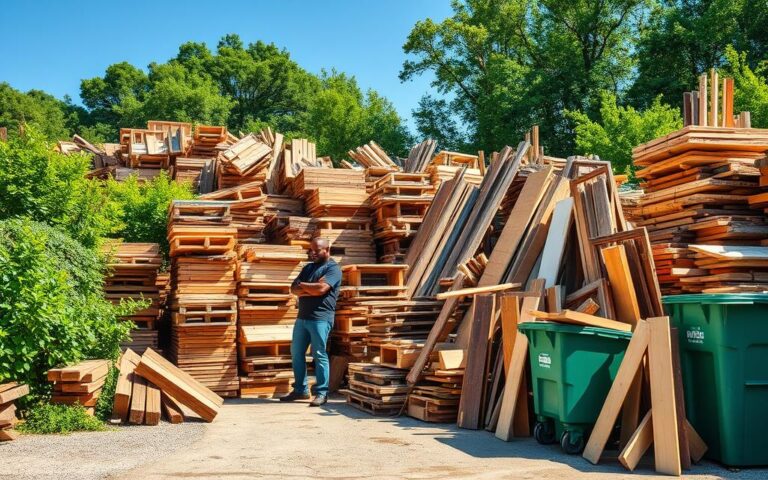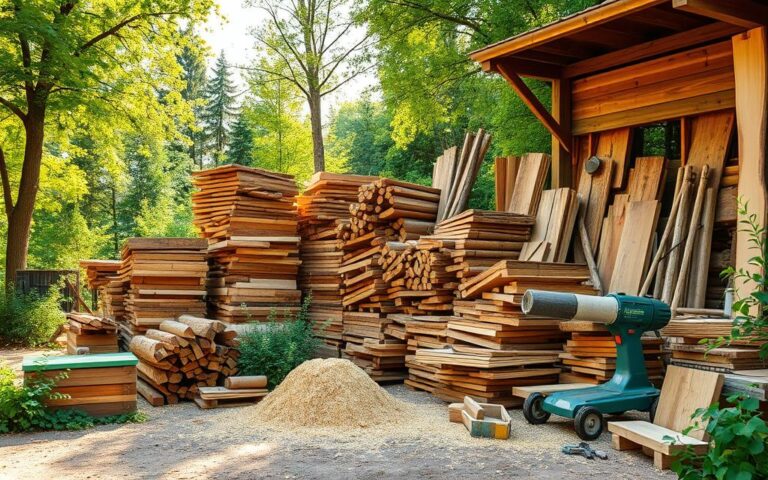Can Compact Discs Be Recycled? Eco-Friendly Tips
Are you wondering if you can recycle your old CDs? In our world, being green is more important than ever. With the move to streaming, we’re left with many CDs that just gather dust. These CDs are made from a kind of plastic known as “No. 7”. It’s hard to recycle. Throwing them away or burning them can harm the environment by releasing dangerous chemicals. We’ll share information about why it’s important to deal with CDs properly. You’ll also learn how to recycle them, find green alternatives, and dispose of them safely.
Key Takeaways
- CDs are made of polycarbonate plastic, classified as No. 7, making recycling challenging.
- Aluminum and gold found in CDs are easily recyclable.
- Burning CDs releases toxic chemicals harmful to health and the environment.
- Specialised recycling companies can turn CDs into reusable plastic products.
- CDs can be creatively repurposed or sold, thus cutting down waste.
Understanding Compact Discs and Their Composition
Compact discs are key for music and data storage. They feature an intricate compact disc composition impacting the environment. Exploring the materials and their environmental effects is crucial.
What Are Compact Discs Made Of?
Compact discs mainly use polycarbonate plastic, classed as No. 7 or “other.” This makes recycling hard. They have three main parts:
- The disc itself
- The plastic case, made of polystyrene (No. 6 plastic)
- The paper liner notes
Aside from polycarbonate, CDs include metals like aluminium and gold, recycled more easily. Making a pound of CD plastic consumes about 300 cubic feet of natural gas, two cups of crude oil, and 24 gallons of water.
The Environmental Impact of Compact Discs
The environmental effects of CDs are worrying. A CD might take a million years to break down in a landfill. Incinerating them releases harmful substances, like hydrochloric acid and dioxins, into the air. This harms the environment and our health. Polycarbonate has bisphenol-A (BPA), linked to health issues like reproductive problems and heart disease.
Every year, over 5.5 million boxes of software CDs end up in landfills and incinerators. Hazardous substances in CDs can pollute water supplies. But, specialized recycling centers can turn CDs and VHS tapes into raw materials. This helps create a circular economy.
| CD Component | Material | Recyclability |
|---|---|---|
| Disc | Polycarbonate | Hard to recycle |
| Plastic Case | Polystyrene | Challenging due to toxicity |
| Paper Liner | Paper | Easy to recycle |
In conclusion, compact discs are useful but their environmental effects during production and disposal need attention and responsible handling.
Can You Recycle Compact Discs?
Recycling CDs is tough due to what they’re made of and their size. Knowing these issues helps people who care about the environment find good ways to recycle.
Challenges of Recycling Compact Discs
Most curbside recycling programmes won’t take CDs. This is because CDs use a mix of plastics that are hard to recycle. They’re made from different materials like polycarbonate, making sorting and recycling them a big task.
CDs are also small and break easily. This means they often end up in the bin by mistake, adding to landfill. Sadly, a CD might take over a million years to break down. Without easy recycling options, many people find it hard to recycle CDs properly.
Identification of Recyclable Components
Some parts of CDs can still be recycled. For example, the plastic case might be recyclable, but you need to check your local rules as they can change. The paper from inside the cases is usually okay to recycle.
It’s a smart move to separate CDs from their cases before recycling. Firms like GreenDisk have special schemes for CD recycling. They make sure the CDs are dealt with right and kept out of landfills. To learn more, you can visit this website.
Alternatives to Recycling Compact Discs
Handling unwanted CDs in ways other than recycling can be both beneficial and green. There are methods to pass on or creatively reuse these discs. This helps avoid filling up our landfills.
Donating or Selling Your Old CDs
Donating CDs to charities, libraries, or thrift shops is a great idea. They often accept music donations, giving discs a new purpose. To make some money, websites like Decluttr and eBay are perfect for selling. Decluttr suggests a box of 60 CDs might fetch around $20. This clears your home and helps those who love music or films save money.
- Goodwill and similar charities welcome old CDs.
- Decluttr offers payment for CDs, pricing them via UPC code.
- On Swapacd.com, you can swap CDs with others easily.
Upcycling Ideas for Compact Discs
Upcycling CDs can be a fun way to get creative. Instead of collecting dust, turn them into something new. Websites like Pinterest have tons of ideas for repurposing CDs into things like:
- Mosaic art
- Coasters
- Custom timepieces
- Homemade ornaments
- Disco balls
- Candle holders
This shows off your creativity and is good for the planet as it keeps discs from becoming waste.
| Method | Description | Benefits |
|---|---|---|
| Donate CDs | Give CDs to charities or libraries. | They support community resources and share music. |
| Sell CDs | Use platforms like Decluttr or eBay. | You can earn cash and find new listeners for your discs. |
| Upcycle | Turn CDs into decorative pieces. | It allows you to be creative and supports eco-friendliness. |
Re-Purposing CDs for Bicycle Safety: A Brilliant and Cost-Effective Solution
In an era where sustainability and resourcefulness are paramount, repurposing items like old CDs for everyday uses is not only eco-friendly but also practical. One innovative application is using CDs as reflectors for bicycles, enhancing rider visibility and safety on the road.
Cycling, whether for commuting or recreation, often involves sharing the road with motor vehicles. Even with a proper bike lamp and rear reflector, there’s still the risk of not being seen by drivers, especially in low-light conditions. Adding extra reflective material to your bicycle increases your visibility and can significantly reduce the chances of accidents.
How CDs Work as Reflectors
CDs, with their shiny, mirrored surfaces, are highly effective at reflecting light. When positioned strategically on your bike, they can catch and reflect headlights, making you more noticeable to drivers from various angles. This is especially helpful in urban areas or poorly lit roads where visibility is crucial.
Where to Attach CDs on Your Bike
To maximize the effectiveness of CDs as reflectors, consider these placement options:
- Sides of the Bike: Attach CDs to the wheel spokes or bike frame to enhance side visibility. This is especially useful at intersections where side visibility matters most.
- Front of the Bike: Secure a CD to the handlebars or front basket for additional frontal reflection.
- Back of the Seat: Place a CD on the back of your seat post for rear visibility.
- Rear Fender or Rack: Attach CDs to the back fender or luggage rack for a highly visible reflective surface.
How to Secure CDs
Fastening CDs to your bike is simple and can be done using items you likely already have at home. Wire, long twist ties, string, or even an old shoelace can be used to secure the CDs in place. Ensure that the shiny side is facing outward for maximum reflectivity.
Affordable Safety for All
The beauty of this idea lies in its accessibility and affordability. You don’t need to purchase expensive gear to improve your bike’s visibility. Old CDs, often destined for landfills, can be repurposed into life-saving safety tools with minimal effort.
By taking a few minutes to repurpose old CDs, you’re not just making your ride safer—you’re also contributing to sustainability by giving new life to discarded materials. Safety doesn’t have to be expensive, and sometimes, the simplest solutions can be the most brilliant.
Safe Disposal Methods for Compact Discs
Getting rid of compact discs properly is essential to lessen their environmental impact. Knowing why we shouldn’t just throw them away is the first step towards responsible disposal.
Why Throwing Them in the Bin Isn’t Ideal
Throwing CDs in regular trash harms the environment. They do not break down and can pollute landfills for a long time. Burning them releases harmful chemicals, dangerous to health and nature. This situation worsens pollution and waste management problems.
Options for Responsible Disposal
There are a few safe disposal methods to consider. These methods reduce the negative effects of wrong disposal:
- Look for local events that collect electronic waste, including CDs.
- Stores like Best Buy have special services for recycling e-waste correctly.
- E-waste recyclers, like GreenDisk, properly handle CDs for a small charge.
- Giving old CDs to charities like Goodwill helps the community and reuses valuable resources.
By using these options, we can help the environment and tackle landfill problems effectively.
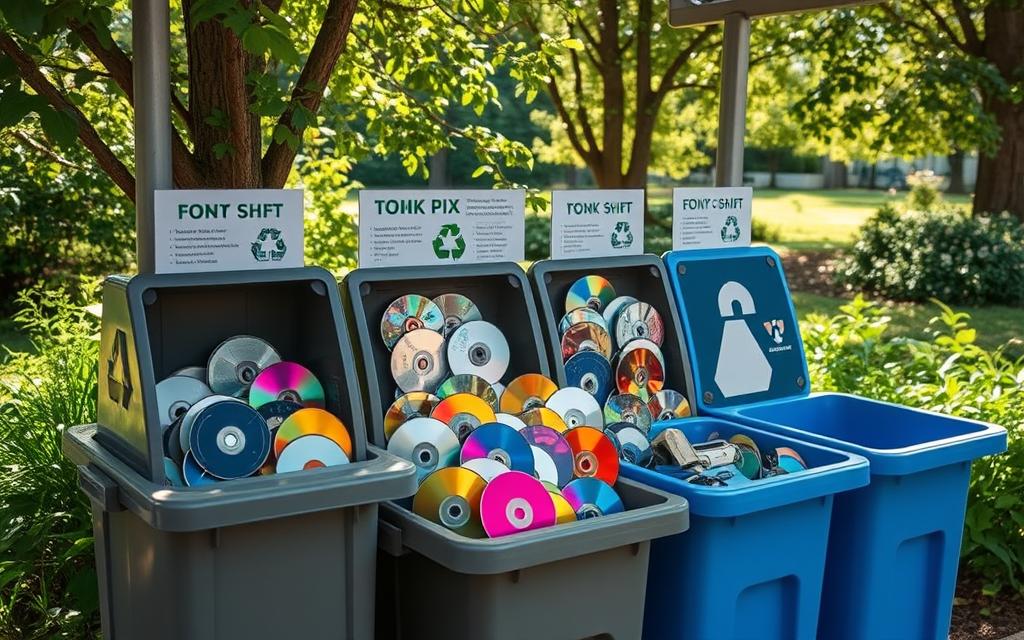
Community Resources for Recycling Compact Discs
There are many community resources for those wanting to recycle compact discs. Getting involved in local initiatives is a big help in recycling e-waste. By doing this, people can make sure their discs are recycled properly.
Local Drop-Off Centres
Some towns have special recycling centres for compact discs and other e-waste. It’s a good idea to check your local government’s website for places and rules. Websites like Earth911.com are handy for finding recycling spots close by. Though not all city programmes take discs, there are still options out there.
Some known drop-off points include:
- CD Recycling Center of America – A great choice for recycling discs.
- Best Buy – They might take jewel cases in their electronics recycling programme.
- Libraries and Goodwill – You can donate disc cases and packaging here.
Mail-in Recycling Programs
If you can’t get to a recycling centre, mail-in options exist. Many companies offer this service, making sure compact discs get recycled the right way. Organisations like GreenDisk and TerraCycle have programs for sending your discs directly. It helps to remove any packaging first to make recycling easier.
Using these services helps the big picture of e-waste recycling.
| Resource | Type of Service |
|---|---|
| CD Recycling Center of America | Drop-off for CDs |
| Best Buy | Electronics recycling including jewel cases |
| GreenDisk | Mail-in recycling program |
| TerraCycle | Mail-in recycling program |
Conclusion
Dealing with CD recycling is complex, but we are finding our way towards eco-friendliness. The unique make-up of CDs makes recycling tough. Yet, we have options like donating or reselling to keep them in use longer.
This approach fits well with the green habits that many people now prefer. Turning old CDs into new, useful items also shows how creative we can be with recycling. It’s crucial to get rid of CDs in a responsible way. Local community initiatives can play a big part in this.
In 2020, only 17.4% of all electronic waste was correctly recycled. Every small step we take can help our planet and encourage others to live more sustainably. Knowing our options for CD recycling helps reduce our impact on the environment.
By following these steps, both individuals and companies can make a difference. As the demand for sustainability grows, choosing to recycle or upcycle CDs shows we care about our planet’s future.
FAQ
Can I recycle my old compact discs?
Yes, recycling compact discs can be hard due to their materials. However, you have options. Look for recycling programmes, mail-in services, or drop-off centres.
What are the environmental impacts of improperly disposing of CDs?
CDs can pollute the environment for over a million years when thrown away improperly. Burning them releases dangerous chemicals. This harms our air and can be a health risk.
How can I safely dispose of my CDs if recycling options are limited in my area?
If it’s hard to find recycling options, think about donating or selling your CDs. You could use local shops, libraries, or online sites. Also, watch for electronic waste events or special disposal services in your community.
Are there any creative ways to reuse old compact discs?
Definitely! You can turn old CDs into art projects. They make great mosaics, coasters, or unique decorations. It’s a fun way to reduce waste and get creative.
What should I do with the cases and liner notes of my CDs?
You might be able to recycle the plastic cases and paper notes. Always check your local recycling rules first. Usually, you need to separate them from the CDs.
How do I find my local CD recycling drop-off centre?
Check your local government website or use Earth911’s search tool. They can help you find a recycling place close to you.
Are mail-in recycling programmes effective for CDs?
Yes, they work well. Companies like GreenDisk and Terracycle can recycle your CDs. Just make sure to remove any packaging first. It helps with the recycling process.

